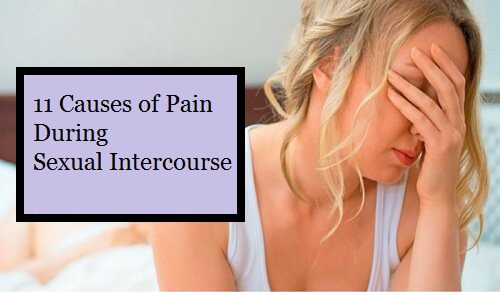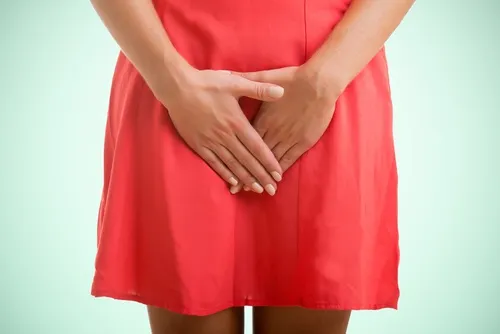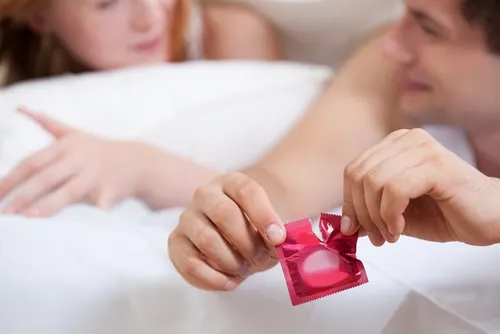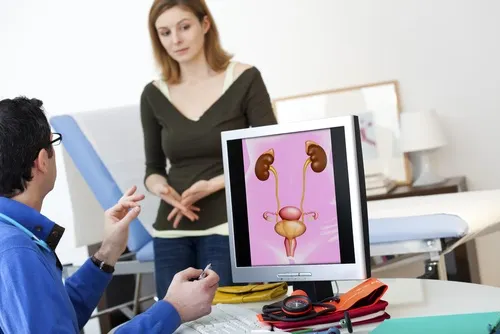11 Causes of Pain During Sexual Intercourse

Experiencing pain during sexual intercourse is quite common, and could cause problems with sexual satisfaction. Today, we’re going to talk about the potential causes of this issue, which affects many people around the world.
According to information from the American Congress of Obstetricians and Gynecologists, 3 out of 4 sexually active women have experienced some type of discomfort during sex.
This pain or discomfort often occurs in the vulva or other areas that surround the opening of the vagina. This pain or discomfort frequently extends to the lower back, the pelvic area, and even the uterus and bladder.
A study from Arizona State University found that this causes a change in women’s sexual performance and also results in emotional reactions.
There are many causes of this problem that are all related to various gynecological conditions and a lack of arousal.
In this article, we’re going to discuss the 11 most common causes of discomfort or pain during sexual intercourse.
Why do I experience pain during sexual intercourse?
1. Skin problems

One common cause of pain during sexual intercourse are ulcers that develop on the delicate skin of the vulva.
A study from the International Society for the Study of Vulvovaginal Disease found that another common cause is contact dermatitis. Allergic reactions caused by a pH imbalance in the vaginal flora can also be the culprit.
A study from the Chilean Journal of Pediatrics found that using perfumed soaps or lubricants can also sometimes cause these problems.
Read also:
2. Injury during sex
Women can also suffer from several internal tears during sex. These can be the source of pain during sexual intercourse and the source of difficulties in maintaining a sexual relationship.
These tears are caused by the increased force exerted on the vaginal passage and sometimes by small injuries.
If the pain remains and leads to the appearance of more symptoms, visit your gynecologist as soon as possible.
3. Vaginal dryness

Vaginal dryness can happen at any age. However, according to a study from the University of Cartagena in Colombia, it’s more common during perimenopause or menopause itself.
This condition happens because of a decrease in estrogen levels. An imbalance of this hormone affects vaginal lubrication. As a consequence, this hormone imbalance could cause irritation and a burning sensation during sex.
In these cases, it’s best to buy lubricants that are sold in pharmacies to resolve this problem. You can also use various home remedies to control hormonal imbalance.
4. Vaginitis
Vaginitis is the inflammation of the vagina, which is caused by a fungal or bacterial infection (University of Boston). Women with this condition not only experience discomfort during sexual intercourse but also a burning sensation and unusual discharge.
5. Vaginismus
Vaginismus is a condition that’s characterized by the involuntary tightening of the walls that surround the vagina, which makes penetration difficult.
This is one of the greatest causes of pain after having sex. This condition is also sometimes a sign of scars or tumors inside the vagina.
Vaginismus treatment usually involves the continuous practice of pelvic floor exercises.
6. Episiotomy
According to a study from the University of Sao Paulo (Brazil), the incision made in the vagina during childbirth or tears in the perineum can also cause problems during sexual intercourse months after giving birth.
To treat this problem, doctors suggest physical therapy, medication, and in special cases, surgery.
Read also:
7. Latex condom allergies

A small number of women have allergic reactions to materials found in condoms and latex.
The discomfort caused by this allergic reaction starts at the very beginning of sexual intercourse and often stops women from fully enjoying sex.
8. Emotional problems
According to the Mayo Clinic, emotional health plays a major role in the pleasure aroused during sexual intercourse. Feelings such as fear, guilt, shame and stress prevent women from fully relaxing, which is necessary to be aroused.
Because of this, sexual desire decreases, which could lead to pain during penetration.
9. Relationship problems

Although many people are unaware of this, relationship problems can interfere with sexual arousal.
This is because a lack of communication, sexual difficulties or infidelity can cause negative effects when it comes to having sexual relations.
10. Certain medications
One of the side effects of taking birth control is a low sex drive.
Furthermore, this side effect occurs when consuming too many analgesics and antibiotics, which also affect the natural lubrication of the vagina (U.S. National Library of Medicine).
11. Cystitis

The continuous need to urinate and vaginal burning cause pain and a loss of sex drive.
As women, it’s important to tend to these conditions in a timely manner in order to prevent them from affecting your sex life.
A gynecological consultation can determine what your problem is and the best way to treat and control it.
All cited sources were thoroughly reviewed by our team to ensure their quality, reliability, currency, and validity. The bibliography of this article was considered reliable and of academic or scientific accuracy.
- Misher, C. (2022). Vaginal dryness and painful intercourse. Cancer Resources from OncoLink, & Treatment, Research, Coping, Clinical Trials, Prevention. https://www.oncolink.org/support/sexuality-fertility/sexuality/vaginal-dryness-and-painful-intercourse
- Doyen, J., Demoulin, S., Delbecque, K., Goffin, F., Kridelka, F., & Delvenne, P. (2014). Vulvar skin disorders throughout lifetime: about some representative dermatoses. BioMed research international, 2014, 595286. https://www.ncbi.nlm.nih.gov/pmc/articles/PMC3910662/
- Manresa, M., Pereda, A., Bataller, E., Terre-Rull, C., Ismail, K. M., & Webb, S. S. (2019). Incidence of perineal pain and dyspareunia following spontaneous vaginal birth: a systematic review and meta-analysis. International urogynecology journal, 30(6), 853–868. https://pubmed.ncbi.nlm.nih.gov/30770967/
- Moshesh, M., Olshan, A. F., Saldana, T., & Baird, D. (2014). Examining the relationship between uterine fibroids and dyspareunia among premenopausal women in the United States. The journal of sexual medicine, 11(3), 800–808. https://pubmed.ncbi.nlm.nih.gov/24467730/
- Nucera, E., Aruanno, A., Rizzi, A., & Centrone, M. (2020). Latex Allergy: Current Status and Future Perspectives. Journal of asthma and allergy, 13, 385–398. https://www.ncbi.nlm.nih.gov/pmc/articles/PMC7532063/
- Reed S. D. (2022). Dyspareunia-where and why the pain?. Menopause (New York, N.Y.), 29(6), 639–641. https://www.ncbi.nlm.nih.gov/pmc/articles/PMC9191839/
- Tetik, S., & Yalçınkaya Alkar, Ö. (2021). Vaginismus, Dyspareunia and Abuse History: A Systematic Review and Meta-analysis. The journal of sexual medicine, 18(9), 1555–1570. https://pubmed.ncbi.nlm.nih.gov/34366265/
-
Wahl, K. J., Imtiaz, S., Lisonek, M., Joseph, K. S., Smith, K. B., Yong, P. J., & Cox, S. M. (2021). Dyspareunia in Their Own Words: A Qualitative Description of Endometriosis-Associated Sexual Pain. Sexual medicine, 9(1), 100274. https://www.ncbi.nlm.nih.gov/pmc/articles/PMC7930843/
This text is provided for informational purposes only and does not replace consultation with a professional. If in doubt, consult your specialist.








